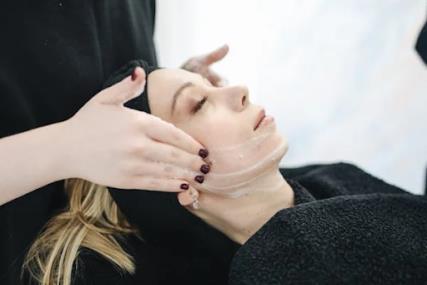The importance of skincare
Skincare is essential for maintaining healthy skin, preventing age-related issues, and enhancing overall appearance. Proper skin care routines can boost confidence and protect against environmental damage and irritation.
The science of skin health and radiance
A brief discussion on skin cells and their life cycle
Skin cells undergo a dynamic life cycle, from formation in the deepest layers of skin to eventual shedding. They protect and regenerate, maintaining the skin’s function and health.
Explanation of how proper skin care can promote healthy skin cell renewal
Proper skincare enhances skin cell renewal by providing essential nutrients, hydration, and protection. This encourages the turnover of old cells, resulting in a vibrant and healthy complexion.
Effect of environmental factors on skin health and glow
Environmental factors significantly influence skin health and radiance, with elements like pollution, UV exposure, humidity, and climate affecting hydration, elasticity, and overall appearance of the skin.
Essential skincare tips to achieve skin radiance
Extra efforts to boost skin radiance
Supplements for skin health
Supplements promoting skin health include vitamins, minerals, and antioxidants that enhance radiance, support hydration, and reduce signs of ageing. A balanced diet further complements these beneficial effects.

Professional skincare treatments and their benefits
Professional skincare treatments offer targeted solutions for various skin concerns, promoting healthier complexions and boosting confidence. These therapies enhance texture, diminish signs of ageing, and improve overall skin health.
Common mistakes that damage the skin
Using the wrong skincare products
Using inappropriate skincare products can lead to irritation, breakouts, and or exacerbate skin conditions. It’s crucial to choose items suited to your specific skin type and concerns.
Over-exfoliation and over-cleansing
Excessive exfoliation and cleansing can disrupt the skin’s barrier, leading to irritation, dryness, and sensitivity. It’s essential to find a balanced routine for healthy skin maintenance.
Neglecting a balanced diet and proper hydration
Failing to maintain a balanced diet and adequate hydration can lead to numerous health issues, impairing overall well-being, energy levels, and the body’s ability to function optimally.
Skin-unfriendly lifestyle habits like smoking and sleep deprivation
Unhealthy practices such as smoking and lack of sleep can damage the skin, leading to issues like premature ageing and reduced elasticity. Prioritizing wellness is essential for healthy skin.
Conclusion
Skincare is an essential aspect of maintaining healthy, radiant skin and enhancing overall well-being. A consistent routine tailored to individual needs, skin types, and concerns can help address issues like dryness, acne, ageing, or sensitivity. Selecting products with quality ingredients, staying hydrated, and protecting the skin from environmental damage are key factors in achieving long-term results. Whether through professional treatments or at-home care, prioritizing skincare not only improves appearance but also boosts confidence. With thoughtful choices and dedication, healthy skin can be a lasting and achievable goal.
Whether through professional treatments or at-home care, prioritizing skincare not only improves appearance but also boosts confidence and supports a more balanced lifestyle. As science and innovation continue to advance, the variety of products and treatments available make it easier than ever to address specific concerns and achieve personal goals. With thoughtful choices, consistency, and a proactive approach, healthy, glowing skin is a realistic and rewarding pursuit for everyone.
Skincare FAQs
What is the correct order for a skincare routine?
The basic order for a skincare routine is:
- Cleanser – To remove dirt, oil, and makeup.
- Toner (optional) – To balance the skin’s pH and prep for other products.
- Serum – To address specific concerns like acne, wrinkles, or pigmentation.
- Moisturizer – To hydrate and lock in moisture.
- Sunscreen (morning only) – To protect from harmful UV rays.
How often should I exfoliate?
Exfoliation should generally be done 1-2 times per week. For sensitive skin, limit to once weekly, while oily skin may benefit from twice a week. Over-exfoliating can lead to irritation and dryness, so it’s important to gauge your skin’s response.
How can I determine my skin type?
To identify your skin type, wash your face with a gentle cleanser, pat dry, and wait an hour without applying products.
- Oily Skin: Feels shiny or greasy, especially in the T-zone.
- Dry Skin: Feels tight or flaky.
- Combination Skin: Oily in some areas (T-zone) and dry in others (cheeks).
- Normal Skin: Feels balanced, neither too oily nor dry.
- Sensitive Skin: Reacts easily to products, often with redness or irritation.
Do I need to use sunscreen indoors?
Yes, sunscreen is important indoors, as UV rays can penetrate through windows. A broad-spectrum sunscreen with SPF 30 or higher is recommended daily.
Can I use the same products in the morning and at night?
While some products, like cleansers and moisturizers, can be used both times, the morning routine should include sunscreen, while nighttime can focus on repair with products like retinol or richer moisturizers.
How long does it take to see results from skincare products?
Results vary depending on the product and concern:
- Hydration products: Immediate to a few days.
- Acne treatments: 4-8 weeks.
- Anti-ageing products: 8-12 weeks.
Consistency is key for noticeable, long-term improvements.
Is natural skincare better than synthetic products?
Not necessarily. The effectiveness depends on the ingredients and formulation. Natural products can be gentle but may not always provide the same targeted benefits as scientifically formulated skincare.
Can I skip moisturizer if I have oily skin?
No. Even oily skin needs hydration to maintain its balance. Opt for lightweight, oil-free, or gel-based moisturizers designed for oily skin.
What ingredients should I look for based on my concerns?
- Acne: Salicylic acid, benzoyl peroxide, tea tree oil.Ageing/Wrinkles: Retinol, peptides, hyaluronic acid, vitamin C.
- Hyperpigmentation: Niacinamide, vitamin C, alpha-arbutin, kojic acid.
- Dryness: Hyaluronic acid, ceramides, glycerin.
- Sensitivity: Aloe vera, chamomile, calendula.
Can diet affect my skin?
Yes, diet plays a role in skin health. Foods rich in vitamins, antioxidants, and healthy fats (like fruits, vegetables, and nuts) can improve skin. Drinking plenty of water and limiting sugar and processed foods may also help reduce breakouts and inflammation.
Are expensive skincare products better?
Price doesn’t always equate to quality. Many affordable products contain effective ingredients. Focus on the formulation and your skin’s specific needs rather than the brand or price tag.
How do I know if a product is irritating my skin?
Signs of irritation include redness, stinging, itching, or breakouts. If you notice these symptoms, discontinue use and consult a dermatologist if the reaction persists.
Can I use makeup if I have acne?
Yes, but opt for non-comedogenic, oil-free makeup that won’t clog pores. Make sure to cleanse your skin thoroughly at the end of the day to remove all traces of makeup.
How do I prevent signs of ageing?
Adopt a skincare routine with:
- Sunscreen to prevent UV damage.
- Antioxidants (like vitamin C) to combat free radicals.
- Retinoids to boost collagen production.
- A healthy life includes proper sleep, hydration, and a balanced diet.
Should I consult a dermatologist for skincare?
If over-the-counter products aren’t effective or if you have chronic skin issues like severe acne, eczema, or psoriasis, it’s advisable to see a dermatologist for a professional assessment and tailored treatment plan.
What is the most recommended skincare routine?
An ideal skincare routine involves three key steps: cleansing to remove dirt, moisturizing for hydration, and applying sunscreen daily to protect against UV damage and premature ageing





